La Via Campesina –transforming agrarian and knowledge politics, and co-constructing a field A laudatio
Topics
La Via Campesina(LVC) has revalorized agrarian politics, transformed knowledge politics, and co-constructed the field of Critical Agrarian Studies. It has shown the important role of agrarian movements in anti-capitalist struggles and the radical reimagination and construction of a positive future. The significance of LVC is found not in the shrinking numerical size of farming populations or in agriculture’s dwindling macroeconomic contributions to national economies, in relative terms, but in the political heft of what it represents in terms of an alternative future that is so different from the current agrarian world.

Federico (“Boy”) Dominguez
Introduction
This essay is written as a laudatio for La Via Campesina (LVC) on the occasion of its thirtieth anniversary. This does not mean that I have no criticisms of LVC and some aspects of its political projects. I have. But this essay is not the place for that. The purpose of this paper is to demonstrate how LVC has transformed agrarian and knowledge politics and co-constructed the field of Critical Agrarian Studies during the past three decades.1 LVC was formally organized as a transnational agrarian movement organization in 1993 – exactly thirty years ago this year. Today, in 2023, it has 182 member organizations in 81 countries, and claims to represent more or less 200 million poor peasants, small and medium size farmers and landless rural laborers. It has become not only the most significant social justice-oriented transnational agrarian movement, but also one of the world-leading anti-capitalist social movements more generally. It has spearheaded global campaigns against exploitation and oppression, expulsion and repression, and has conceptualized and constructed systemic alternatives that have gained traction far beyond the ranks of the agrarian working class. For example, it took the lead in the campaign against the World Trade Organization (WTO) from the 1990s onwards, while it has also pioneered alternatives, notably food sovereignty and agroecology, which have gone on to become widely popular and adopted by multiple sectors beyond farming.2
This paper is organized in three main sections, structured as follows. The next section explains the major contributions of LVC in terms of revalorizing agrarian politics, transforming knowledge politics and co-constructing the field of Critical Agrarian Studies. The subsequent section explains how LVC has made its contributions amid dynamics of unity, diversity and adversity among and between social groups, issues and organizations. The paper concludes with a brief discussion about the difference between ‘half empty’ and ‘half full’ perspectives in assessing radical social justice movements like LVC.
'La Via Campesina - transforming agrarian and knowledge politics, and co-constructing a field: a laudatio'. The Journal of Peasant Studies, March 2023.



